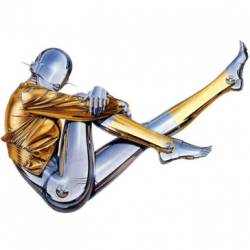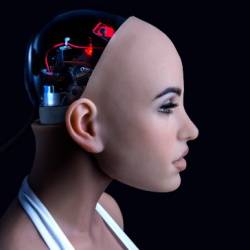Robotics Expert David Levy on Sexbots, Love, and Loneliness
Author of Love and Sex with Robots writes about impetus for human-android relationships.
 |
Riding the dust storm of the wildly popular show Westworld, David Levy recently penned a piece for The Daily Mail on what he sees as the future of human-robot sexuality, or, as the publication puts it: the dawn of the sexbots.
Levy always offers an entertaining read—his positive attitude toward robosexuality—when people are sexually attracted to robots—is particularly refreshing. The man, after all, did write the book on the subject: Love and Sex with Robots.
Sexbots and us: a matter of time
While a bit scarce on talking about the new HBO show, Levy still manages to be entertaining and informative. Most of the piece is dedicated to his belief that human-robot relationships aren’t just healthy, but that in a few short years we’ll be seeing actual legal marriages between organic and inorganic beings.
What’s particularly insightful is his very human argument for humans falling in love—and lust—with sexbots: loneliness.
It’s something that far too many people seem to have forgotten when talking about the attraction between humans and their creations. Sure, some have talked about sexbots as being a new form of human sexuality, or even part of an allure for technology, but here Levy comes right out and says it:
“There are many millions of people in this world who are very lonely because they have no one to love and no one who loves them.”
There’s a kind of chill that comes along with reading those words. Levy reminds us in one sentence that sexbot love, for so many, could come down to a choice between something or nothing:
“For these socially challenged people, a more appropriate question to ask is not ‘Why is it better to love or have sex with a robot than with another human?’, but ‘Is it better to love or have sex with a robot or to have no love or sex at all?'”
These statements are even more refreshing when you have people like Kathleen Richardson of the Campaign Against Sex Robots on the other side of the fence; people who seem to ignore that while sexbots may bring their own unique problems, they also could be a solution to people in serious emotional pain.
The state of sexbot tech
In addition to his speculation about their therapeutic uses, Levy mentions developments in sexbot technology from Abyss Creations, the maker of the popular silicone RealDoll, but and non-sexual robots such as those from Hanson Robotics.
But even here in his discussion of synthetic skin, sensors, teledildonics, and other hardware, he manages to pull us into the bigger picture: emotions.
He quotes a remarkably sensitive Matt McMullen, CEO of Abyss Creations, who says that it’s not about the nuts and bolt, but creating a real connection between his sexbots and their users:
“I want to have people actually develop an emotional attachment to not only the robot but the actual character behind it. To develop some kind of love for this being.”
We like those that are like us
Levy also addresses Kathleen Richardson’s concerns that since humans don’t need empathy to sexually connect with sexbots, we could be “promoting non-empathetic forms of living as adults.”
He points out that a key element in human emotional relationships is the idea of similarity: that we are attracted to people—or even things—that mirror ourselves in level of education, attitudes, or a common interest.”
Naturally, this will take some wizardry-level software writing but, he points out, that’s just a matter of time.
Looking forward
Personally, I’m glad that Levy is out there, preaching his acceptance and positivity toward the possible future of humans and robots.
We need more voices like his, and less Westworld. Someone who sees the inevitable development of androids, and sexual attraction to them, as not something celebrating the worst aspects of humanity but instead the best: love and desire.
Image source: Love and Sex with Robots Congress, John McStravick
Leave a reply
You must be logged in to post a comment.

















